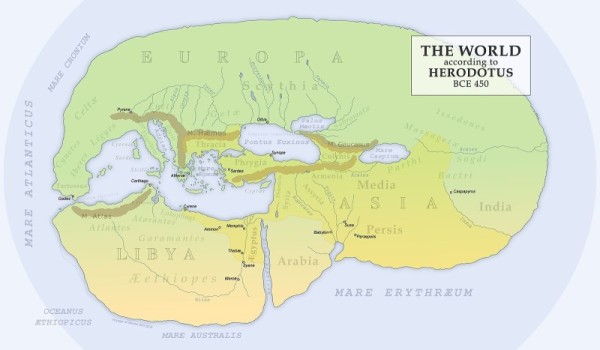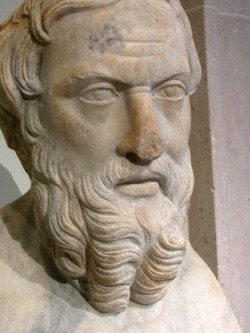Oracle tells Greeks that the Gods disapprove of colonizing Libya.

Translated by George C. Macaulay — our special project presenting the complete Herodotus with URLs for all of those people, places, events, and things which baffles and discourages modern readers.
Previously on Herodotus
148. To these then, I say, Theras was preparing to set forth, taking with him people from the tribes, and intending to settle together with those who have been mentioned, not with any design to drive them out, but on the contrary claiming them very strongly as kinfolk. And when the Minyai after having escaped from the prison went and sat down on Taÿgetos, Theras entreated of the Lacedemonians, as they were proposing to put them to death, that no slaughter might take place, and at the same time he engaged himself to take them forth out of the land. The Lacedemonians having agreed to this proposal, he sailed away with three thirty-oared galleys to the descendants of Membliaros, not taking with him by any means all the Minyai, but a few only; for the greater number of them turned towards the land of the Paroreatai and Caucones, and having driven these out of their country, they parted themselves into six divisions and founded in their territory the following towns, — Lepreon, Makistos, Phrixai, Pyrgos, Epion, Nudion; of these the Eleians sacked the greater number within my own lifetime. The island meanwhile got its name of Thera after Theras who led the settlement.
149. And since his son said that he would not sail with him, therefore he said that he would leave him behind as a sheep among wolves; and in accordance with that saying this young man got the name of Oiolycos, and it chanced that this name prevailed over his former name: then from Oiolycos was begotten Aigeus, after whom are called the Aigeidai, a powerful clan in Sparta: and the men of this tribe, since their children did not live to grow up, established by the suggestion of an oracle a temple to the Avenging Deities of Laïos and OEdipus, and after this the same thing was continued in Thera by the descendants of these men.
150. Up to this point of the story the Lacedemonians agree in their report with the men of Thera; but in what is to come it is those of Thera alone who report that it happened as follows. Grinnos the son of Aisanios, a descendant of the Theras who has been mentioned, and king of the island of Thera, came to Delphi bringing the offering of a hecatomb from his State; and there were accompanying him, besides others of the citizens, also Battos the son of Polymnestos, who was by descent of the family of Euphemos of the race of the Minyai. Now when Grinnos the king of the Theraians was consulting the Oracle about other matters, the Pythian prophetess gave answer bidding him found a city in Libya; and he made reply saying:
Lord, I am by this time somewhat old and heavy to stir, but do thou bid some one of these younger ones do this.
As he thus said he pointed towards Battos. So far at that time: but afterwards when he had come away they were in difficulty about the saying of the Oracle, neither having any knowledge of Libya, in what part of the earth it was, nor venturing to send a colony to the unknown.
151. Then after this for seven years there was no rain in Thera, and in these years all the trees in their island were withered up excepting one: and when the Theraians consulted the Oracle, the Pythian prophetess alleged this matter of colonising Libya to be the cause. As then they had no remedy for their evil, they sent messengers to Crete, to find out whether any of the Cretans or of the sojourners in Crete had ever come to Libya. These as they wandered round about the country came also the city of Itanos, and there they met with a fisher for purple named Corobios, who said that he had been carried away by winds and had come to Libya, and in Libya to the island of Platea. This man they persuaded by payment of money and took him to Thera, and from Thera there set sail men to explore, at first not many in number; and Corobios having guided them to this same island of Platea, they left Corobios there, leaving behind with him provisions for a certain number of months, and sailed themselves as quickly as possible to make report about the island to the men of Thera.

CC BY-SA 2.0 image from Wikipedia.
152. Since however these stayed away longer than the time appointed, Corobios found himself destitute; and after this a ship of Samos, of which the master was Colaios, while sailing to Egypt was carried out of its course and came to this island of Platea; and the Samians hearing from Corobios the whole story left him provisions for a year. They themselves then put out to sea from the island and sailed on, endeavoring to reach Egypt but carried away continually by the East Wind; and as the wind did not cease to blow, they passed through the Pillars of Heracles and came to Tartessos, guided by divine providence. Now this trading-place was at that time untouched by any, so that when these returned back home they made profit from their cargo greater than any other Hellenes of whom we have certain knowledge, with the exception at least of Sostratos the son of Laodamas the Eginetan, for with him it is not possible for any other man to contend. And the Samians set apart six talents, the tenth part of their gains, and had a bronze vessel made like an Argolic mixing-bowl with round it heads of griffins projecting in a row; and this they dedicated as an offering in the temple of Hera, setting as supports under it three colossal statues of bronze seven cubits in height, resting upon their knees. By reason first of this deed great friendship was formed by those of Kyrene and Thera with the Samians.
153. The Theraians meanwhile, when they arrived at Thera after having left Corobios in the island, reported that they had colonised an island on the coast of Libya: and the men of Thera resolved to send one of every two brothers selected by lot and men besides taken from all the regions of the island, which are seven in number; and further that Battos should be both their leader and their king. Thus then they sent forth two fifty-oared galleys to Platea.
– Herodotus, Book IV
| <—Previous | Master List | Next—> |
Herodotus made his living by being interesting. In a world where most people did not read and could not afford to buy a book even if they could, they would pay to listen to Herodotus recite from his books. They would not pay to be bored. In that world, the names that populate his stories would have some general familiarity to his audience. Their obscurity to us is a barrier that this series seeks to break down.
MORE INFORMATION
MAP LIBRARY
Because of lack of detail in maps as embedded images, we are providing links instead, enabling readers to view them full screen.

Leave a Reply
You must be logged in to post a comment.